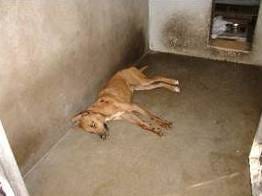Codifying Euphemisms
Shelter (verb): to protect or shield from something harmful.
Shelter (noun): a refuge; a place giving temporary protection from danger.




One of the biggest challenges our movement faces is that legislators defer to city pounds and their enablers, like the ASPCA, National Animal Control Association, and the California Animal Welfare Association, falsely believing they have the best interests of animals at heart. Instead, they promote and defend the violent model of killing.
But because legislators defer to them, legislation that would spare animals from being killed stalls every year. In California, Colorado, New York, and elsewhere, bills to require pounds to notify rescuers before killing animals in order to give those rescuers the ability to save them failed due to opposition from these organizations.
Compare that to the kinds of laws that are passed. The heads of some of the most regressive pounds and do-nothing SPCAs in California — including those where animals cannibalized other animals because they weren’t fed, where animals have died of starvation and untreated illnesses, where pound staff have slammed animals into cages or kicked them while holding them down, or in cities where the pound doesn’t even adopt out animals — have successfully passed a law that replaces the term “pound” with the word “shelter” and the word “poundmaster” with “director” in all statutes where they appear. The groups argued that the terms “pound” and “poundmaster” have a “negative stigma.”1
While pre-killing notification bills would have saved tens of thousands of animals yearly, the law that did pass will not result in a single animal being placed instead of killed, nor will it improve conditions in these neglectful and abusive agencies. What it does is codify euphemisms, just like a prior law they succeeded in passing, which changed the word “kill” to “euthanize,” even for healthy and treatable animals.
But here’s the rub: they can call it “euthanasia” instead of killing, but it is still killing. They can call themselves a “shelter,” but when they act like a pound, they are a pound. And there isn’t a euphemism they can think of to enshrine into law that will apply a thick enough gloss to cover up the unvarnished and ugly truth.
Our government should have more important things to do than make these poundmasters feel better about the killing they do. But ask them to pass legislation that would actually help animals — and the dogcatchers come out in droves to stop it, even though if we did pass those laws, we would not have to worry about what to call it.
Despite codifying euphemisms into law, many of us long ago stopped using the euphemisms “euthanasia” and “putting them to sleep” to describe the killing of animals who are not irremediably suffering. Many of us also reject “shelter” to describe pounds that kill. A shelter is a refuge, a haven. By contrast, a pound is “an enclosure maintained for confining stray or homeless animals.” To impound means to “imprison.” Act like a dog catcher, and you are a dog catcher.
But what about the terms “lifesaving,” “saving lives,” and even “save rates”? Aren’t they euphemisms too? For most animals entering and then leaving “shelters,” they are. If an animal has been hit by a car or is suffering from a serious disease and enters a shelter that provides that animal with veterinary assistance that prevents death, that animal has been saved by a shelter. Likewise, when a rescue organization takes an animal from death row at a pound, that animal has also been saved because the rescuer intervened to prevent the animal from being killed by someone else.
But when the term “lifesaving” is used to describe a pound choosing to adopt out an animal instead of killing that animal, killing is implied to be a natural outcome of animal “homelessness” that must be overcome, which it is not. Homelessness is not a fatal condition — or at least it shouldn’t be. Moreover, most animals who enter pounds are healthy and treatable and not in danger of dying, but for the threat the pound poses.
Pound employees cannot accurately be described as having “saved” an animal when the only threat the animal faced was the one that they themselves presented. In short, if someone was threatening to kill you and chose to let you live instead, would you describe that person’s actions as having “saved” you?
Indeed, despite killing animals rescuers offer to save, the Los Angeles County pound illegally threatens to fire volunteers who describe the pound using language the poundmaster considers “negative,” even on their own personal social media pages. For example, they are not allowed to say that an animal was “killed.” Instead, they are told to use euphemisms like “put to sleep.”


I want to go there and kick a few keister's so badly
Thank you for your tireless efforts to help our fellow souls., Nathan. God Bless, you!!